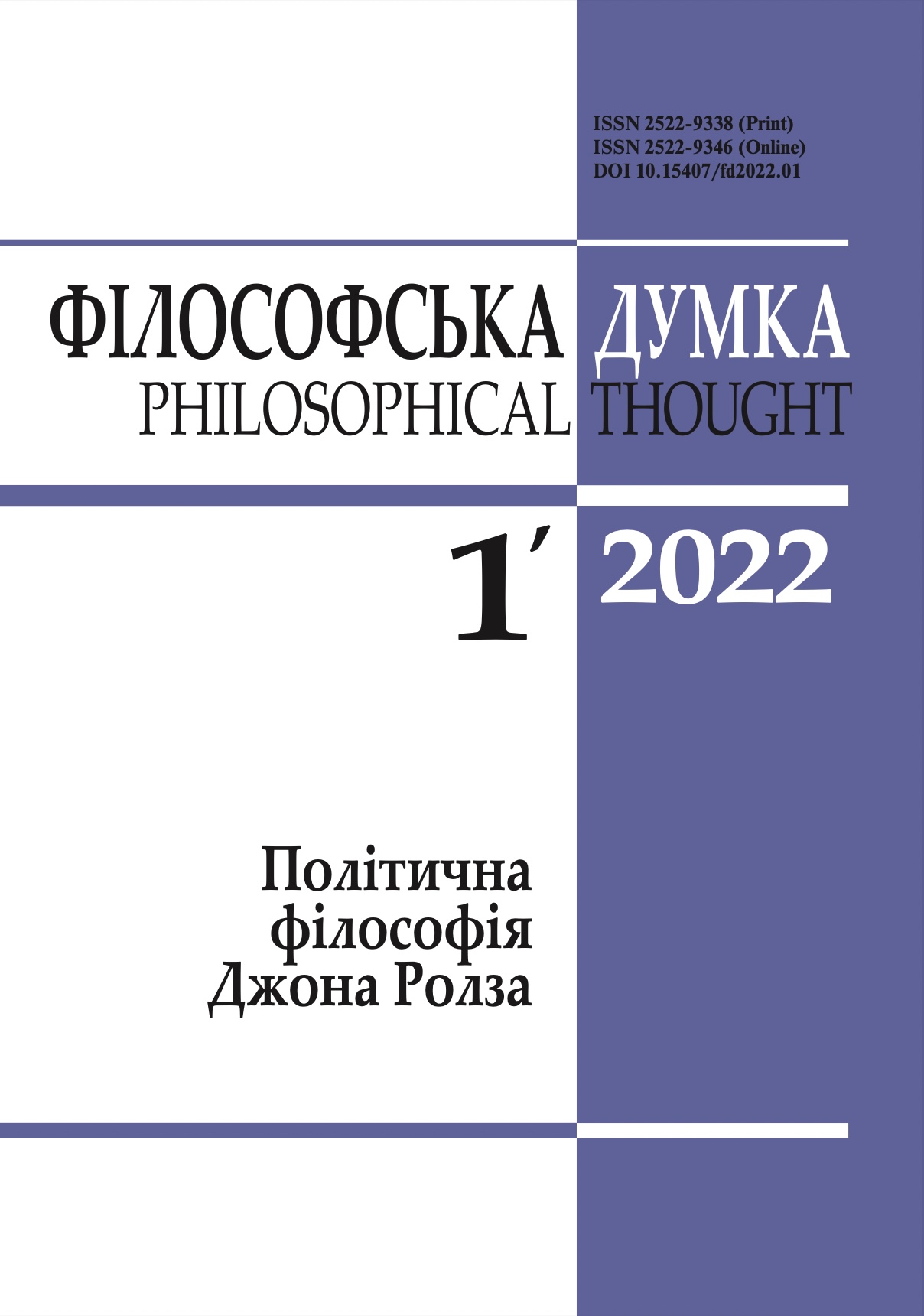THE PATH TO “A THEORY OF JUSTICE”: WORKS BY JOHN RAWLS OF THE 40s — EARLY 50s
JOHN RAWLS’S POLITICAL PHILOSOPHY
DOI:
https://doi.org/10.15407/fd2022.01.023Keywords:
John Rawls, community, disagreement, ethical principles, justiceAbstract
Over the many years that have passed since John Rawls published “A Theory of Justice” (1971), researchers have considered Rawls’s theory to be a new stage in the development of the liberal tradition of Locke and Kant. However, after Rawls’s papers were opened at the Harvard Uni- versity Archive, it became clear that this established idea is not entirely accurate. Studying Rawls’s early works, most of which are still unpublished, allowed to see more comprehensively both the stages and the features of the formation of his theory and, in general, to look at the history of the development of political philosophy in the twentieth century in a new way. The focus of this paper is on the works of Rawls, written in the 40s and the first half of the 50s. They are still poorly studied. Moreover, since we are talking about works written before Rawls’s trip to Oxford, when his “Wittgensteinian turn” (P. Mackenzie Bock) was completed, we can consider them a separate stage in the development of his thought. They are undoubtedly of interest to researchers. An anal- ysis of early works by Rawls makes it possible to see that he was beginning to form the basic concepts of the Rawlsian theory of justice even before his trip to Oxford. In these works, Rawls has not yet studied the topic of justice itself; nevertheless, they lay the foundations for the concepts of a “well-ordered society” and the “original position”, the interpretation of the circumstances of justice that we find in “A Theory of Justice”. And, although after the war Rawls renounces religion, resulting in his search for basic ethical principles of fair cooperation that can be rationally justified, he nevertheless retains in his further works a general orientation towards the social ideal, which he formed in the 40s within the tradition of neo-orthodox Protestant theology.
References
Adams, R.M. (2009). The Theological Ethics of the Young Rawls and Its Background. In: J. Rawls. A Brief Inquiry into the Meaning of Sin and Faith / Ed. by Th. Nagel (pp. 24-103). Cambridge, London: Harvard University Press.
https://doi.org/10.4159/9780674054486-001
Bevir, M., Gališanka, A. (2012) John Rawls in Historical Context. History of Political Thought, 33 (4), 701-725.
Bok, M. P. (2017). "The Latest Invasion from Britain": Young Rawls and His Community of American Ethical Theorists. Journal of the History of Ideas, 78 (2), 275-285.
https://doi.org/10.1353/jhi.2017.0015
Bok, M.P. (2020). Inside the Cauldron. Rawls and the Stirrings of Personalism at Wartime Princeton. In: S. Shortall, D. Steinmetz-Jenkins (Eds.), Christianity and Human Rights Re- considered (pp. 158-188). Cambridge: Cambridge University Press.
https://doi.org/10.1017/9781108341356.010
Edmundson, W.A. (2017). John Rawls: Reticent Socialist. Cambridge. Cambridge University Press.
https://doi.org/10.1017/9781316779934
Eich, S. (2021). The Theodicy of Growth: John Rawls, Political Economy, and Reasonable Faith. Modern Intellectual History, 18 (4), 984-1009.
https://doi.org/10.1017/S1479244320000475
Gališanka, A. (2019). John Rawls: The Path to a Theory of Justice. Harvard: Harvard University Press.
https://doi.org/10.4159/9780674239463
Gregory, E. (2007). Before the Original Position. The Neo-Orthodox Theology of the Young John Rawls. The Journal of Religious Ethics, 35 (2), 2007, 179-206.
https://doi.org/10.1111/j.1467-9795.2007.00303.x
Habermas, J. (2010). The "Good Life" - A "Detestable Phrase": The Significance of the Young Rawls's Religious Ethics for His Political Theory. European Journal of Philosophy, 18 (3), 443-454.
https://doi.org/10.1111/j.1468-0378.2010.00424.x
Hale, E. (2014). Hong Kong's Youngest Activists Draw Inspiration from Political Liberalism. South China Morning Post, July 16. URL: https://www.scmp.com/news/hong-kong/arti- cle/1555279/unlike-world-peers-hong-kongs-young-activists-are-inspired-american (ac- cessed 15.12.2021).
Hart, H.L.A. (2012). The Concept of Law. Third edition. Oxford: Oxford University Press.
https://doi.org/10.1093/he/9780199644704.001.0001
Krishnan, N. (2021). John Rawls and Oxford Philosophy. Modern Intellectual History, 18 (4), 940-959.
https://doi.org/10.1017/S1479244320000451
Nelson, E. (2019). The Theology of Liberalism. Political Philosophy and the Justice of God. Cambridge, London: The Belknap Press of Harvard University Press.
https://doi.org/10.4159/9780674242944
Päivänsalo, V. (2007). Balancing Reasonable Justice. John Rawls and Crucial Steps Beyond. Helsinki: Ashgate.
Pogge, Th. (2007). John Rawls. His Life and Theory of Justice / Tr. by M. Kosch. New York: Oxford University Press.
https://doi.org/10.1093/acprof:oso/9780195136364.001.0001
Rawls, A.W. (2009). Editor's Introduction. Journal of Classical Sociology, 9 (4), 357-370.
https://doi.org/10.1177/1468795X09344377
Rawls, J. (1950). A Study in the Grounds of Ethical Knowledge: Considered with Reference to Judg- ments on the Moral Worth of Character. Ann Arbor. URL: https://www.proquest.com/open- view/815004834a79bc28ae3287d3db905ec3/1?cbl=18750&diss=y&loginDisplay=true&p q-origsite=gscholar# (accessed 20.12.2021).
Rawls, J. (1951). Outline of a Decision Procedure for Ethics. The Philosophical Review, 60 (2), 177-197.
https://doi.org/10.2307/2181696
Rawls, J. (1991). For the Record (Interview by Samuel R. Aybar, Joshua D. Harlan, and Won J. Lee). The Harvard Review of Philosophy, 1 (1), 38-47.
https://doi.org/10.5840/harvardreview1991115
Rawls, J. (2009a). A Brief Inquiry into the Meaning of Sin and Faith. In: In: J. Rawls. A Brief Inquiry into the Meaning of Sin and Faith / Ed. by Th. Nagel (pp. 103-259). Cambridge, London: Harvard University Press.
https://doi.org/10.4159/9780674054486
Rawls, J. (2009b). On My Religion. In: J. Rawls, A Brief Inquiry into the Meaning of Sin and Faith / Ed. by Th. Nagel (pp. 259-271). Cambridge, London: Harvard University Press.
https://doi.org/10.4159/9780674054486
Smith, S. (2021) Historicizing Rawls. Modern Intellectual History, 18 (4), 906-939.
https://doi.org/10.1017/S147924432000044X
Stace, W.T. (1937). The Concept of Morals. London: Macmillan and Co.
Downloads
-
PDF (Українська)
Downloads: 1114
Published
How to Cite
Issue
Section
License
Authors who publish with this journal agree to the following terms:
- Authors retain copyright and grant the journal right of first publication.
- Authors are able to enter into separate, additional contractual arrangements for the non-exclusive distribution of the journal's published version of the work (e.g., post it to an institutional repository or publish it in a book), with an acknowledgement of its initial publication in this journal.
- Authors are permitted and encouraged to post their work online (e.g., in institutional repositories or on their website) prior to and during the submission process, as it can lead to productive exchanges, as well as earlier and greater citation of published work (See The Effect of Open Access).


